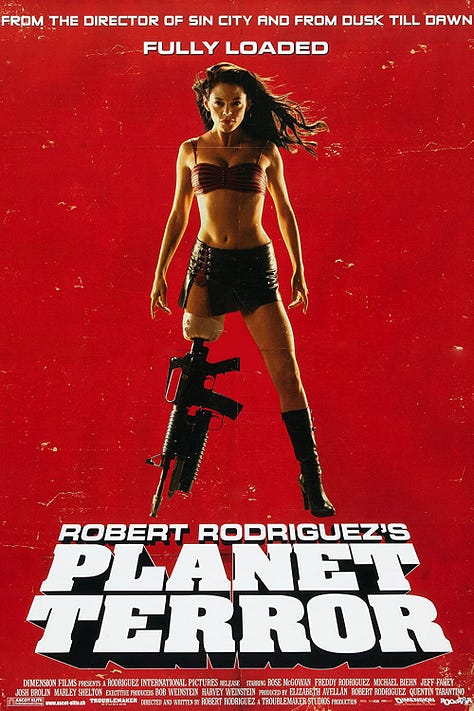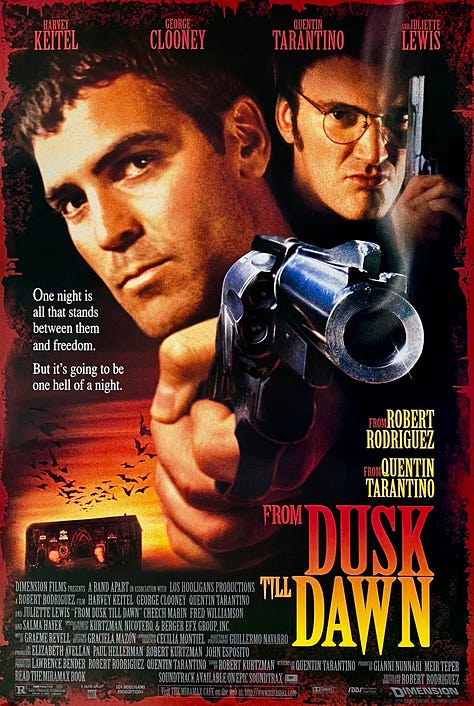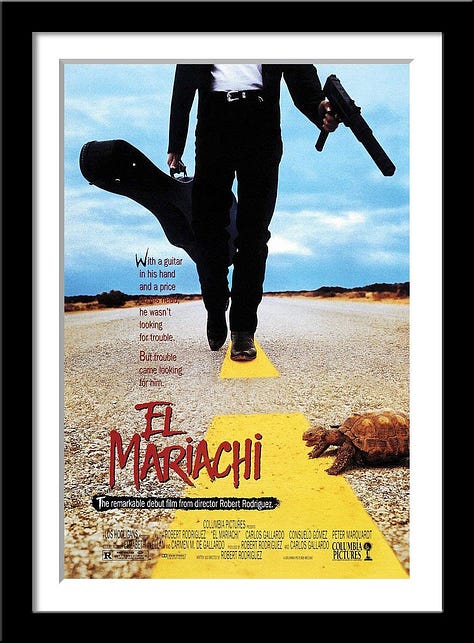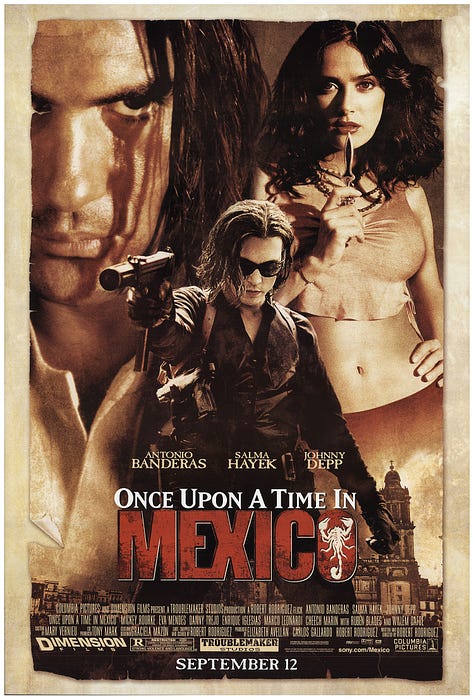








I’ve watched a few of Robert Rodriguez’s movies before listening to his interview (#98) by Tim Ferriss in August, 2015. You can watch the interview here:
Or you can listen to it here:
Or you can read the transcript here:
Who is Robert Rodriguez?
Robert Anthony Rodriguez (born June 20, 1968) is an American filmmaker, composer, and visual effects supervisor.
He shoots, edits, produces, and scores many of his films in Mexico and in his home state of Texas. Rodriguez directed the 1992 action film El Mariachi, which was a commercial success after grossing $2.6 million ($5.5 million in 2023 dollars) against a budget of $7,000 ($14,937 in 2023 dollars). The film spawned two sequels known collectively as the Mexico Trilogy: Desperado and Once Upon a Time in Mexico.
Rodriguez was born in San Antonio, Texas, on June 20, 1968. He is the third of ten children born to Cecilio, a cookware sales manager, and Rebecca, a nurse.
Rodriguez was interested in making films from an early age. He would make home movies with his friends and family. He would also draw comic strips and write stories.
In 1986, Rodriguez enrolled at the University of Texas at Austin to study film. However, he dropped out after two years to pursue his filmmaking career full-time. In 1991, he made his feature film debut with El Mariachi. The film launched Rodriguez's career (more below).
Rodriguez has since gone on to make a number of successful films, including Desperado (1995), From Dusk Till Dawn (1996), Sin City (2005), Grindhouse (2007), Machete (2010), and Spy Kids (2001). He has also directed a number of television shows, including From Dusk Till Dawn: The Series (2014-2016) and Matador (2010).
Rodriguez is known for his innovative filmmaking techniques and his unique visual style. He is also known for his low-budget films, which he often makes with his friends and family. Rodriguez is a true independent filmmaker, and he is one of the most successful and influential filmmakers working today.
In addition to his work as a filmmaker, Rodriguez is also a successful businessman. He owns his own production company, Troublemaker Studios, and he also has a number of other business ventures, including a record label and a clothing line. Rodriguez is a true renaissance man, and he is constantly expanding his horizons.
Rodriguez is a role model for many young filmmakers. He is proof that it is possible to achieve success in Hollywood without compromising your vision.
Creativity
From the Tim Ferriss show, #98
Tim: Do you have any tricks or approaches that you use over and over again to keep morale high and get the best out of people?
Robert Rodriguez: I've worked with the same crew, some of them for over 20 years. So they kind of know already the philosophy I tend to have. And I've learned this not through filmmaking but through other disciplines sometimes, working with painters and sculptors and musician friends. It’s kind of why I do so many different jobs because creativity isn’t job specific. If you know how to be creative, you can literally jump from job to job with no training and do them pretty well.
Because the technical part of any job is 10 percent. 90 percent of that is creativity. If you already know how to be creative, you’ve kind of got the battle half beat, which is you don’t need to know. You don’t need to know what note specifically you’re going to play when you get on stage and do your solo.
Everybody will go, what did you just play? And you’re going to go, I don’t know. I asked Jimmy Vaughn that: “How do you know what you’re playing just now?” “I don't even know what I played.” “Well, it was fantastic. Did anybody tape it?” “ No.” That’s another one that goes off into the air.
Ask any of the greats, painters. I studied under a painter, Sebastian Kruger. I went all the way to Germany to watch him paint, to figure out his trick; how does he do it? Because I tried to do what he did and it looked like garbage.
He must have a special brush; he must have special paint and a special technique. And I go and now, he starts with a mid tone, starts knocking in some highlights, a little bit on the chin and then he goes to the eye. And I go, “How do you know where to go next?” He goes, “Oh, I never know; it’s different every time.”
That drives me bonkers. What do you mean? How come I can’t do that? And I'd go sit down and suddenly I could do it. It blows you away. So I take those lessons back and I teach my actors that; I teach my crew that. You don’t need to know.
Tim: “What was the realization when you sat down and suddenly…”
Robert: You get it in your own way. Thinking that you needed to know something, a trick or a process, before it would flow. If you got out of the way, it would just flow. What gives you permission to let it flow, sometimes if you take four years of schooling or you study under somebody, then you’ve suddenly given your permission to let it flow. And I know you’re a guy who likes to take a shortcut in. Here’s the shortcut: just get out of your own way.
You’re just opening up the pipe and the creativity flows through. And as soon as your ego gets in the way, and you go I don’t know if I know what to do next; you’ve already put “I” in front of it and you’ve already blocked it a little bit. I did it once but I don’t know if I can do it again. It was never you. The best you can be is just to get out of the way so it comes through.
So when an actor comes to me or a crew member and he goes, I'm not sure I know how to play this part. I go, that’s beautiful because the other half’s gonna show up when we’re there.
They say knowing’s half the battle. I think the most important part is the other part; not knowing what’s going to happen but you trust that it will be there when you put the brush up to the canvas. It’s going to know where to go. And the further you’re out of the way of it, it’ll just happen.
Constraint
Robert: I want all of them to not have enough money, not enough time so that we’re forced to be more creative. Because that’s going to give it some spark that you can’t manufacturer. And people will tap into it or they’ll go: I don’t know why I like this movie. It’s kind of a weird movie but there’s something about it that makes me want to watch it again and again because it’s got a life to it. Sometimes art should be imperfect, in a way.
Tim Ferriss: The point you made just a minute ago about creativity transferring from one area to the next, to seemingly unrelated skills and areas I think is really important. I cannot recommend highly enough that people check out The Director’s Chair:
The rest of “the Directors Chair” interviews (Quentin Tarantino, Luis Valdez, George Miller, Francis Ford Coppola and more): https://www.youtube.com/@doogiansdocumentaries2201
One of the terms that jumped out that you mentioned in your last example was the gremlins. How do you embrace the gremlins and turn them to your advantage?
The example of the ending of Back to the Future, and how the church tower and all of that was because the studios just refused to finance this more spectacular ending.
Robert: Things you would think were planned for years were created at the last moment. I couldn’t believe that myself. That’s why I enjoy doing those interviews. I truly want to know these things because they still blow me away. The creative process blows me away. And it applies to so much that even if you’re not a director or a filmmaker, you watch that and you see people talking about the creativity and the creative process. And you see how it applies to anything that you do; how you raise your children, how you cook food, how you run a business.
Creativity is so much a part of that. When people say: oh, you do so many things; you’re a musician, you’re a painter, you edit, you’re a composer, you’re a cinematographer, you’re the editor. You do so many different things. I go, no, I only do one thing. I live a creative life.
When you put creativity in everything, everything becomes available to you.
Anything that has a creative aspect is suddenly yours to go and do. And there’s no separation between work and play.
I mean I work, quote-unquote, in my house. That’s why I write my scripts, come up with my ideas while I'm playing with my kids, while I'm cooking them a meal, which is a creative exercise – art you can eat – in itself.
And then you go upstairs and do some editing. You edit a scene you like and can already hear the music for it. And I'll walk over to this room and I'll do music for it.
Then you go hmm, I'm not sure about this character. I'm going to get into this character’s head. Maybe I'll paint him first and kind of see visually what he looks like, or musically what he sounds like.
And you can work completely nonlinear that way because you realize I can do anything I want because everything can be creative. Even the bisexual call, suddenly. You go, this is kind of out of my league but let me add my creativity to it and maybe that’ll solve something no one else would be able to solve. And sure enough, you can always rely on creativity to sort of win the day in a lot of areas.
There are a lot more thoughts on creativity and analogies in Tim’s podcast.
Rodriguez is a true inspiration for anyone who wants to be creative. He shows us that it is possible to achieve great things if we are willing to work hard, take risks, and be creative.
Here are some specific tips that we can learn from Rodriguez:
Be resourceful. Don't let a lack of money stop you from making your film. There are many ways to get creative with your budget.
Use your imagination. Don't be afraid to think outside the box and come up with new and innovative ways to tell your story.
Have a strong vision. Know what you want to achieve and don't be afraid to go after it.
Be willing to adapt. Things don't always go according to plan, so be prepared to change course if necessary.
Work hard. Creativity takes time and effort. Don't expect to be successful overnight.
Take risks. Don't be afraid to put yourself out there and try new things.
If you follow these tips, you'll be well on your way to becoming a creative force like Robert Rodriguez.
Movies
As previously mentioned, Rodriguez's breakthrough film was "El Mariachi" (1992), which he wrote, directed, edited, and scored. The film was made on a shoestring budget of only $7,000 and was a critical and commercial success. It won the Audience Award at the 1993 Sundance Film Festival and grossed over $2 million at the box office.
He followed up with "Desperado" (1995), a bigger-budget action film starring Antonio Banderas. The film grossed over $25 million at the box office and established Rodriguez as a major talent in Hollywood.
Rodriguez continued to make genre films with "From Dusk Till Dawn" (1996), a horror-comedy starring George Clooney and Quentin Tarantino. The film was a box office success, grossing over $25 million worldwide.
In 2001, Rodriguez directed "Spy Kids," a family-friendly adventure film that became a surprise hit. The film grossed over $147 million worldwide and spawned three sequels.
Other notable films directed by Rodriguez include "Sin City" (2005), "Grindhouse" (2007), "Machete" (2010), and "Alita: Battle Angel" (2019).
Here is a list of his top-grossing films, according to Box Office Mojo:
Spy Kids 3-D: Game Over (2003) - $197 million
Spy Kids 2: The Island of Lost Dreams (2002) - $119 million
Spy Kids (2001) - $147 million
Alita: Battle Angel (2019) - $404 million
Sin City (2005) - $159 million
Machete (2010) - $44 million
Sharkboy and Lavagirl 3-D (2005) - $69 million
Once Upon a Time in Mexico (2003) - $98 million
Desperado (1995) - $25 million
From Dusk Till Dawn (1996) - $25 million
He continues to be a major force in the film industry, inspiring new generations of filmmakers with his unconventional approach to filmmaking on a budget.
It is safe to say that he is one of the most successful filmmakers working today.
According to Box Office Mojo, Rodriguez's films have grossed over $1.5 billion worldwide. This puts him in the top 100 highest-grossing filmmakers of all time. His most successful film, Sin City, grossed over $460 million worldwide.
TV
Rodriguez is also a successful television producer. His television series From Dusk Till Dawn: The Series was a critical and commercial success. It ran for three seasons on the El Rey Network.
He also directed Chapter 14 of the second season of The Mandalorian and the premiere episode and the third episode of The Book of Boba Fett. He also voiced Dokk Strassi and Mok Shaiz in The Book of Boba Fett.
Music
His band: Chingon was formed by film director Robert Rodriguez to record songs for his 2003 film Once Upon a Time in Mexico. They contributed to Mexico and Mariachis, a compilation album from Rodriguez' Mariachi Trilogy, and released their debut album, Mexican Spaghetti Western, in 2007.
The band's name comes from a Mexican slang term, chingón, loosely meaning "badass".
This Facebook post explains the guitar:
I'm playing my exact replica Van Halen guitar that Fender made only 300 of in the US. My dream guitar. I had to have it when it was released back in 2007.
What I always loved about the original guitar is that Eddie built it himself when he was young and broke.
When he played it, the music he made was innovative, changed rock guitar forever, and inspired millions.
I can't think of any other musician that built the instrument that made them famous, and then reinvented the music that the instrument played. And it wasn't just a guitar, he managed to make it an incredible piece of pop art.
His artistry, his guitar, his music, and Eddie himself became iconic. Even his name - VAN HALEN became legendary. Icon on top of icon.
Edward Van Halen, a true legend and a true inspiration.
A video of Robert having some fun on the set of “the Mandalorian” while directing.
9 More Facts
His first film, "Bedhead" (1991), was made with his brothers and sisters as the cast and crew and was shot in his parents' house.
Rodriguez was offered the chance to direct the first "Harry Potter" film, but turned it down to focus on his own projects.
Rodriguez has a close relationship with Quentin Tarantino and directed a segment of the film "Four Rooms" (1995), which was produced by Tarantino.
Rodriguez is a skilled cartoonist and often draws his own storyboards for his films.
He has a strong interest in technology and was an early adopter of digital filmmaking, shooting his film "Once Upon a Time in Mexico" (2003) with a digital camera.
Rodriguez is a trained chef and has published a cookbook titled "Cooking With Robert Rodriguez."
He has a love of comic books and graphic novels and has adapted several works into films, including "Sin City" (2005) and "Alita: Battle Angel" (2019).
Rodriguez is known for his frugal filmmaking methods and often handles multiple roles on his films, including writing, directing, editing, and scoring.
He is a strong advocate for independent filmmaking and has mentored and supported up-and-coming filmmakers throughout his career.
Please share, comment and like if you think it’s worth the read. Thanks to the new subscribers! Peace!








Excellent piece. Thank you 🙂
Enjoyed the point about resourcefulness.
It appears the common traits of people that have experienced success in their lives are undertones of adversity earlier in their lives that they overcame.
Often this takes the form of shortcomings like lack of access to resources.
Sometimes I feel bad for folks who are born with it all, because they never have to develop the resource muscle 💪